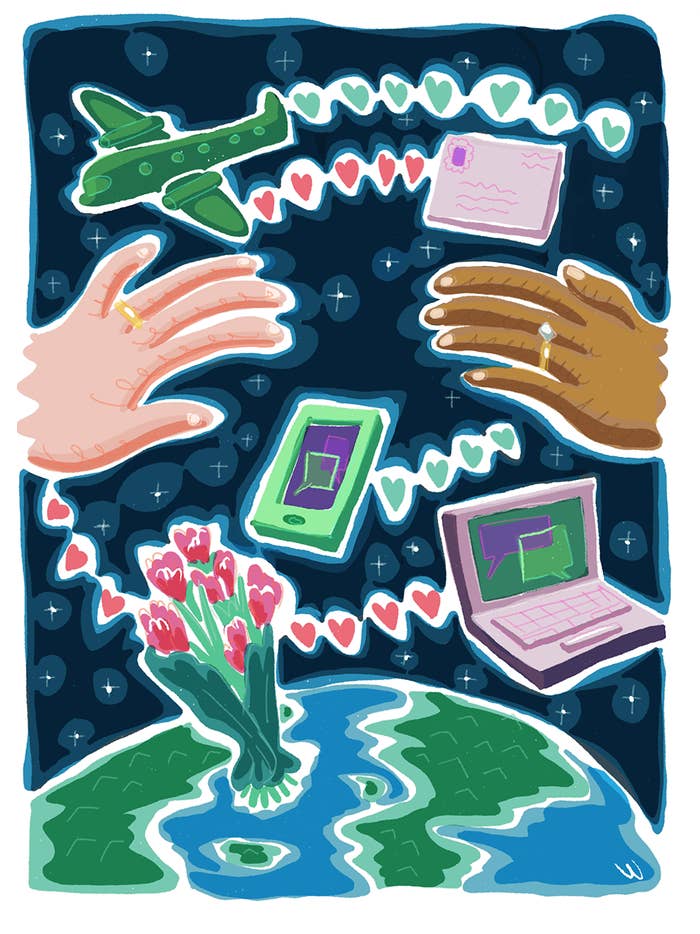
When people hear that a married couple is living separately, they tend to assume something about the relationship is broken.
But thousands of married couples around the world live apart for short or long periods of time, for a variety of reasons: School, military service, work, family commitments, and immigration issues are among the most common. Being apart isn't necessarily a sign that something is wrong — it can also mean that the couple is confident and committed. But that doesn't make it any easier when you come home after a long, shitty day and your spouse is 7,000 miles and 10 time zones away.
After I put out a call for stories about long-distance marriages via the BuzzFeed Community, I received more than 300 responses from people who have spent (or are currently spending) an extended period of time living away from their spouse. Many experienced frustration and profound loneliness — one woman said her and her husband's increasingly separate lives felt "like a string being pulled apart from two ends." But the stories I got were, almost without exception, incredibly hopeful.
Even though long-distance relationships have a (well-deserved!) reputation for being challenging, many said that being in a long-distance marriage was profoundly different from being in a long-distance dating situation. Instead of worrying about whether their relationship would survive, they focused on getting through it together. And nearly everyone I interviewed found more than just a silver lining to the experience — they found a stronger relationship on the other side.
Here are four of their stories.
Star, 27, Bloomington, Indiana, and Louie, 27, College Station, Texas
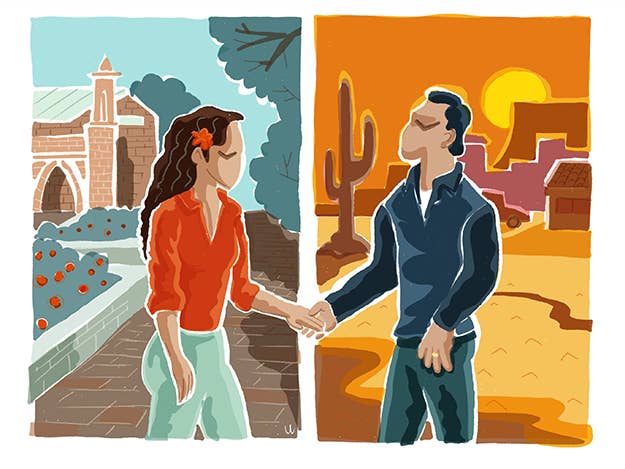
Star and Louie are high school sweethearts who have been together since October 2006. They went to the same college and got married in March 2013. They have been living separately since the fall of 2014 while Star completes law school.
Star: Going to Indiana University for law school was my dream since I was a little kid. I was applying to schools closer to where we lived in Texas; I toyed with a school in Dallas or San Antonio. But when I got into IU, it was the most obvious option for me since it was such a good school. I asked Louie what he thought about it, and he said, "If you get accepted, you go, and we'll figure it out." We'd done long-distance during undergrad for internships. By the time law school happened, we were like, "We can do this."
Louie: When we got engaged, we started seriously discussing the type of lifestyle we wanted. It was very obvious to both of us that in order for us to achieve this, we would have to make sacrifices, and distance was the biggest of them all. As prepared as you think you are, though, it still sucks.
Both my older brothers are enlisted service members. They are both happily married and their families make yearlong sacrifices when they are called for duty overseas. So my wife being in another state didn't seem like such a big deal compared to what our brave soldiers and their families do.
Star: We've both come to the conclusion that it's best that we're separated during this time. We went to college together, so we know what it's like to want to stay home, miss a class, or take a drive together. It would probably be really difficult for me to commit and do good work in law school if he were here. I would procrastinate. Plus, he really wanted to make a good impression at work and be available to them.
Louie: Almost every person I speak to about my wife being in another state for law school tells me I'm crazy. They cannot comprehend how much we trust each other, and they all used to doubt that we would make it. Since she's been in school already a year and a half, they [co-workers] are now recognizing and realizing that it is possible. They still think that I'm crazy for letting her go out to have drinks with friends, or that she is in organizations where she can be "surrounded by men." The only people that have been positive and supportive are our families, but even they have said that what we're doing is "unheard of."
Star: Right now, we see each other at least once a month, not including winter and summer break. Last semester, we were in a wedding in Las Vegas, and we wanted to save money, so we sacrificed seeing each other more so we could have a good time there. It was hard; we'd gone about two months without seeing each other.
When you're not together, how do you stay connected?
Star: Mostly by phone. We're not big fans of FaceTiming, but we just got into a Sunday morning ritual where we get on FaceTime and drink coffee together. We text throughout the day. I have a lot of homework and reading and sometimes it's really hard for me to talk to him because I'm in meetings or the library, so it'll be a short conversation, and that's kind of sad.
Louie: I make sure to tell her good morning every day before I go to work, and we talk for about an hour before going to bed.
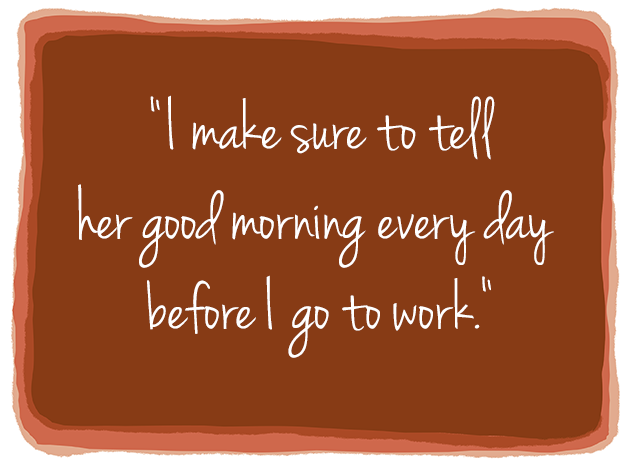
Does the distance create a financial strain?
Star: Definitely. We have two rents to pay; we have to buy two sets of groceries. I also have our dog. He's like our baby, and he comes with expenses. The main financial strain we have is the need to see each other. We decided before I left that we'd try to see each other twice a month. We did that a lot my first year, but it's pretty expensive to fly, and the drive is 15 ½ hours. It's a pain.
What emotional toll does it have on you?
Star: It sucks. It's pretty sad; it comes and goes in waves. Being in law school is pretty miserable at times, and it's hard to come home and not be able to cry on my husband's shoulder. That takes away from a relationship. A big part of a relationship is being in the same room and not having to say anything. It's hard falling asleep alone.
Louie: Sometimes, I'll feel sad, and then I'll be angry. The sadness happens because when I come home from a long day of work, I would just like to see her or hug and kiss her, but I can't. That's usually followed by anger that it's BS that we have to make such a sacrifice, and I question whether we made the right decision. The hardest part is spending the weekends alone. I go do things to distract myself, but it's not the same without her.
Star: Not being able to help him through that is really hard.
Louie: In the beginning, I felt selfish for staying and working in Texas instead of looking for something in Indiana. The frustration also comes and goes, only because I want to spend time with her and I can't.
Star: It takes a toll, but when I see him, it's rejuvenating. Overall, it's going a lot faster than we expected. And our dog helps! I could come home miserable, and he's the happiest little light.
Are there any ways you think it's actually strengthened your relationship?
Star: The distance makes us appreciate each other more, so it's kind of a good thing.
Louie: It's made me realize what I have and how I should never take her for granted. I also feel a deeper sense of love for her when I am with her. Distance makes you realize how bad you truly miss your spouse and how much love and respect there is in the relationship. I will admit it gets lonely, but you realize that's a small sacrifice for a long and prosperous future together.
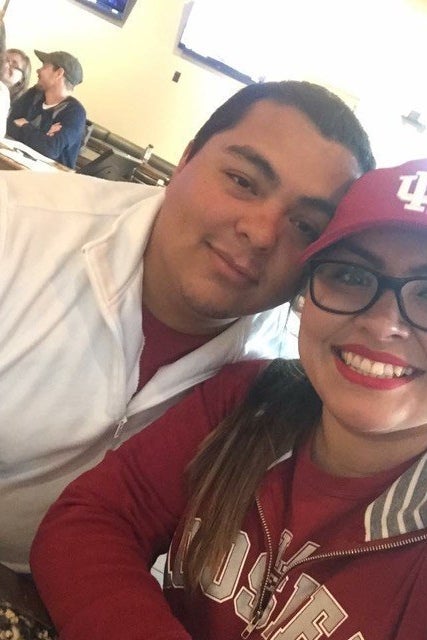

What do you miss the most about each other?
Star: I really miss waking up to him, drinking two cups of coffee, and discussing something political or legal. He's really interested in what I'm studying, so he'll bring up opposing arguments and we go back and forth about them.
Louie: I miss the way she makes me laugh, our conversations and debates over a wide range of topics. Her overall quirkiness, I love it. I miss everything about her. She's my best friend.
What advice do you have for anyone in (or planning to be in) a long-distance marriage?
Louie: Communication and trust is key for any distant relationship. You have to work at it, but it is possible.
Star: It's totally possible. You hope you live a long enough life to say this was just a blink — especially if it's something so positive and something that contributes so much to the relationship. It's an investment to make.
Anna, 24, Quezon City, Manila Philippines, and Mel, 27, Markham, Ontario, Canada
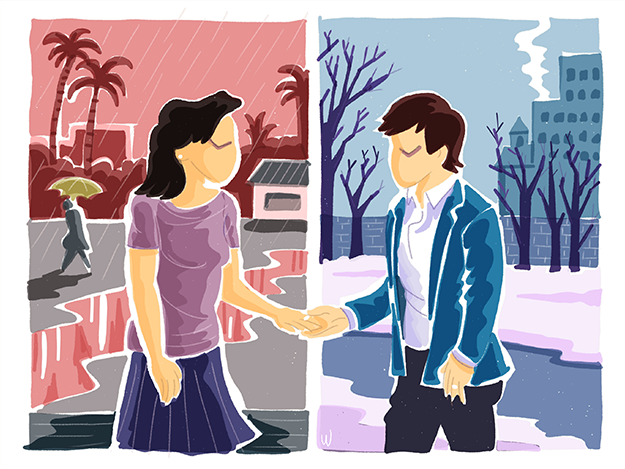
Anna and Mel have been together for three and a half years, married for four months, and have never lived together — or even lived in the same country.
Anna: Mel and I met on Tumblr. When we started dating three years ago, we were already long-distance. Being a lesbian couple, we definitely had a hard time getting married. I couldn't go to Canada, where it was legal to get married, as getting a visa was tough, and we couldn't get married in the Philippines because same-sex marriage wasn't legal.
We decided to get married in New Zealand, where it was legal and would be recognized, but we could only stay for a week as we had to go back to our respective countries and attend to our jobs. We got married on Oct. 27 and we had to go our separate ways on Nov. 2. Basically, since we got married, we've only been together physically for six days.
Mel: At the beginning of our separation, I really didn't feel any different, but as time goes by, you realize how much you want her to be with you already so you can start your married life together. Getting married meant that I could sponsor her as my spouse, and it can make the process faster so we can finally be with each other and start our lives together.
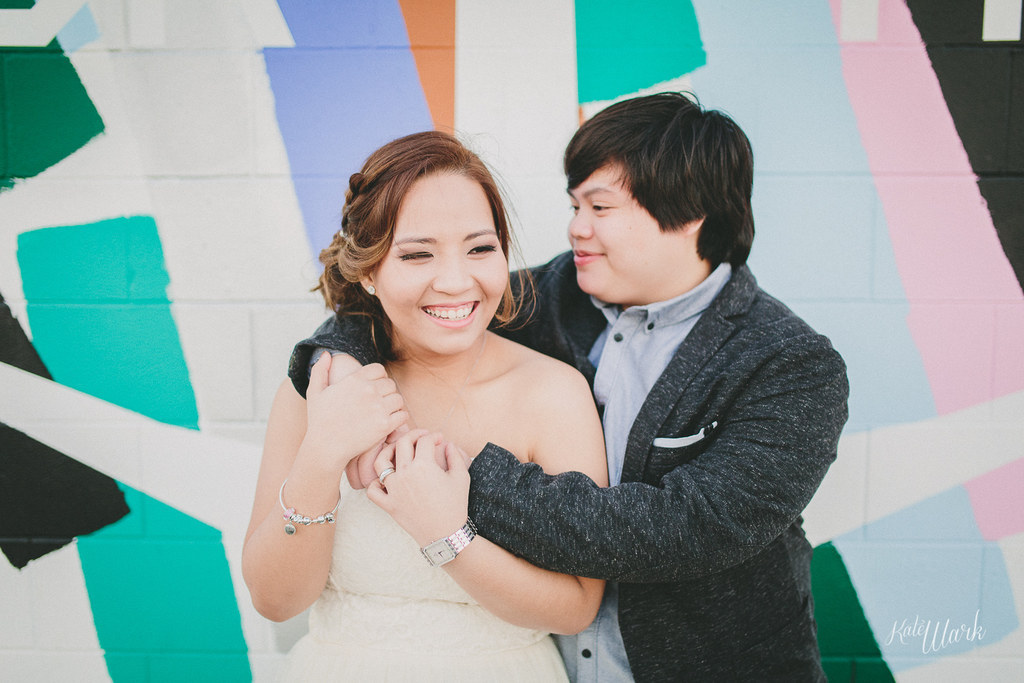
Anna: Since Mel and I have been long-distance since we started dating, we're already used to being away from each other. I guess the biggest factor that differentiates a marriage from a relationship is the fact that we're now more certain about our future together. We no longer have break-up tendencies and we're more bent on making it work.
The Canadian visa process is long and complicated; Anna submitted a sponsorship application in November 2015, as well as their marriage certificate, photos, copies of plane tickets, and more. They are hoping to be reunited in Canada in September or October of this year.
Mel: I see Anna every year, for a month or so. I am a chef, and luckily, my work approves my one-month leave since I've been working at that restaurant for a long time. This year, I'm not going to the Philippines because in just a few months she will be coming here for good. We stay connected mainly with Blackberry Messenger and FaceTime. Also, social media like Facebook, Instagram, Twitter, etc. help.
Mel: The hardest part is always that heart-shattering airport goodbye. We have to do it every year. It doesn't get easier. The first three days when I go back here in Canada are always the worst. The heartache we both go through after spending time together and not knowing what's next for us strains our relationship.
Anna: It's very hard to be alone all the time. You have to do everything on your own and it's difficult not to be jealous when around other normal couples. There are times I'd ask myself, Why do they have it so easy and why do we have it so hard?
We try as much as possible to talk to each other about our feelings, but to be honest, sometimes words are never enough. When you're together, arguments are easier to end. You can just come over, kiss and make up. In a long-distance marriage, that doesn't work. When you're a normal couple, silence is normal, you don't talk all the time. In a long-distance one, it's more uncomfortable and makes you think something's wrong.
Mel: I'm always scared that she might get used to the fact that I'm not with her. I don't want her to forget how it feels when we're actually together.
Anna: The time difference makes it harder. Sometimes I need my wife, but she's not available at the moment because she's either at work or sleeping already, and the same goes for her. There are times when you just wish to be a normal married couple.
Are there any ways you think it's actually strengthened your relationship?
Mel: I think the distance made us unbreakable. Even though it's unbearable at times, it made us realize how much we truly love each other and what sacrifices we would make just to be together.
Anna: We learned to be more sensitive to each other's feelings and we've learned to really make time for each other. Since we're apart, we tend to be more vocal about our feelings, so we can fix our misunderstandings right away. I guess the best thing the distance has taught us is the fact that we're really made for each other and that our love is indeed a choice. Staying together is a choice, and so is making this marriage work.
The best surprise in this relationship is how we try to make each other feel loved. From simple calls to grand gestures like sending surprise cakes, flowers, pizza, etc. to each other, we never fail to express how much we love each other. Gestures that seem like too much for others are the only way for us.
What's been your biggest source of support during this time?
Mel: I made myself busy with work. Also, support from the people around me. My family and friends always tell me not to worry about it too much because time will pass by so fast, and before I know it, I will be on a plane to go and see her again.
Anna: My family and friends. We're both out to our families and they accept and love us. When I feel lonely, all I have to do is surround myself with the people I love and I feel fine again. We're lucky that we have a very loving support system.
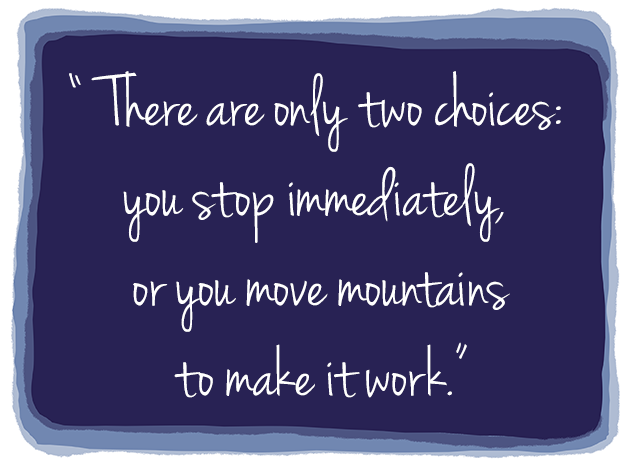
What advice do you have for anyone in (or planning to be in) a long-distance marriage?
Mel: It's not for the weak. It takes everything you have to make it work at times, but in the end, it's all worth it. In just a matter of months, we will be ending the distance and I can't wait. It's everything I've ever wanted. I think when you meet someone and they are on the other side of the world, there are only two choices: You stop immediately, or you move mountains to make it work. There is no half-assed way of doing it. You have to give it your all to keep the love alive.
Anna: Love is always worth it. Distance is just a test. If you really see a future with someone, even if she's living 13,000 km away, then by all means, do everything to make it work.
Tina, 27, and Jesse, 27, Urbana, Illinois
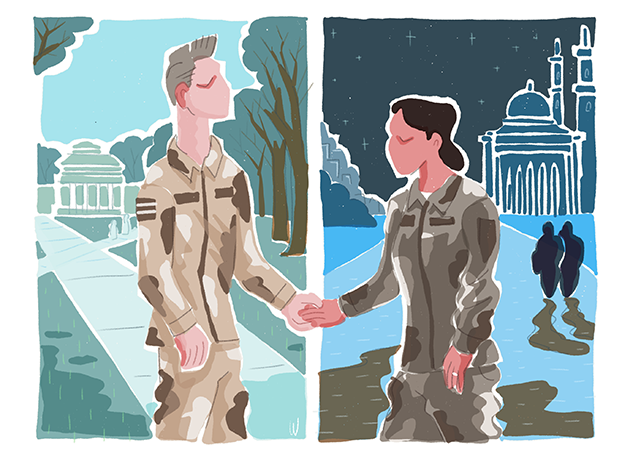
Tina and Jesse have been together for five years and married for nearly three and a half years. Both were active duty in the military; Jesse has been deployed to Afghanistan twice, and Tina has been deployed once. They were in separate locations in Afghanistan for a majority of 2013. They have spent about one and a half years of their marriage apart (not all of it consecutive) and currently live together while they both attend grad school.
Tina: We were both in ROTC at Western Illinois University, and had committed to serving active duty after we graduated. We were friends, and it was one of those things where he liked me and I had no idea. Out of the blue one day [in December 2010], he told me he liked me, but he'd graduated and moved to Arizona and I was still in college. I had done a long-distance relationship before, and it didn't work out. So I turned him down because of that.
But we kept talking, and after I visited him in Arizona for a weekend, I knew I had to pursue this more. Committing to a long-distance relationship was risky because the Army is so unpredictable; I could've gotten stationed in Germany, Korea, etc. We agreed to live in the moment and see what happened.
Jesse: Tina and I dated long-distance for about 14 months [starting in February 2011]. Actually, our whole relationship was long-distance aside from the times that we would visit each other. Even the first eight months of our marriage was done long-distance.
Tina and Jesse got engaged in April 2012, halfway through Jesse's first deployment to Afghanistan, and married in a small civil ceremony six days later.
Jesse: When we were apart but both in the U.S. for training, we tried to see each other every month to six weeks, but that would depend on both of our schedules. When we were deployed at the same time [beginning in April 2013], we were able to see each other once a month, as part of Tina's job required her to travel to where I was located, but she would normally arrive in the morning and leave in the evening, and we both still had to work, so we mainly spent time eating lunch and/or dinner together.
Tina: There's no PDA allowed in the military, so when we visited each other in Afghanistan, we couldn't hug, kiss, or hold hands. There'd be a friendly punch on the shoulder or something just so we could have some physical contact, so that was really hard. We couldn't do the things we wanted to when you haven't seen each other in a while.
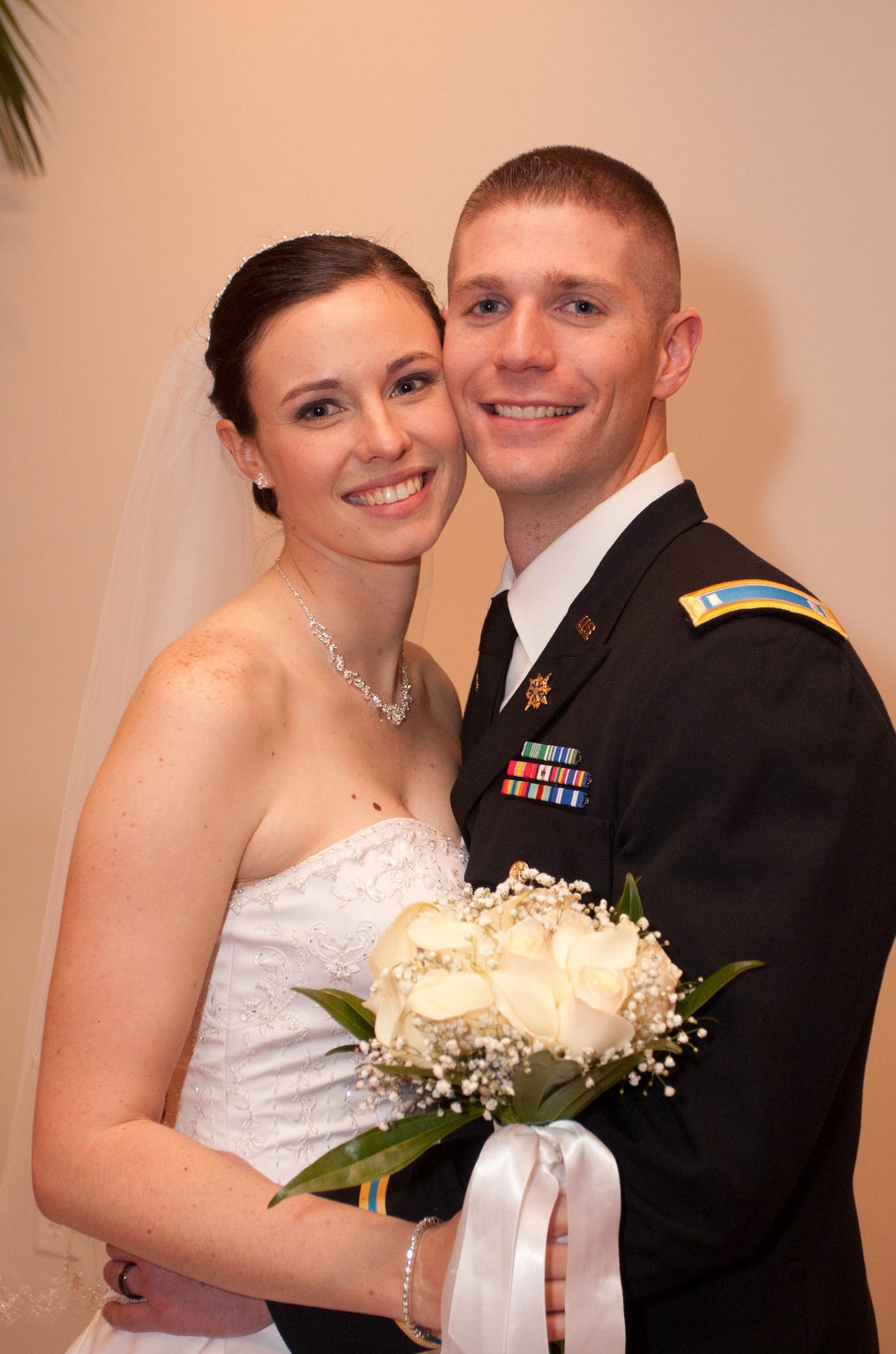
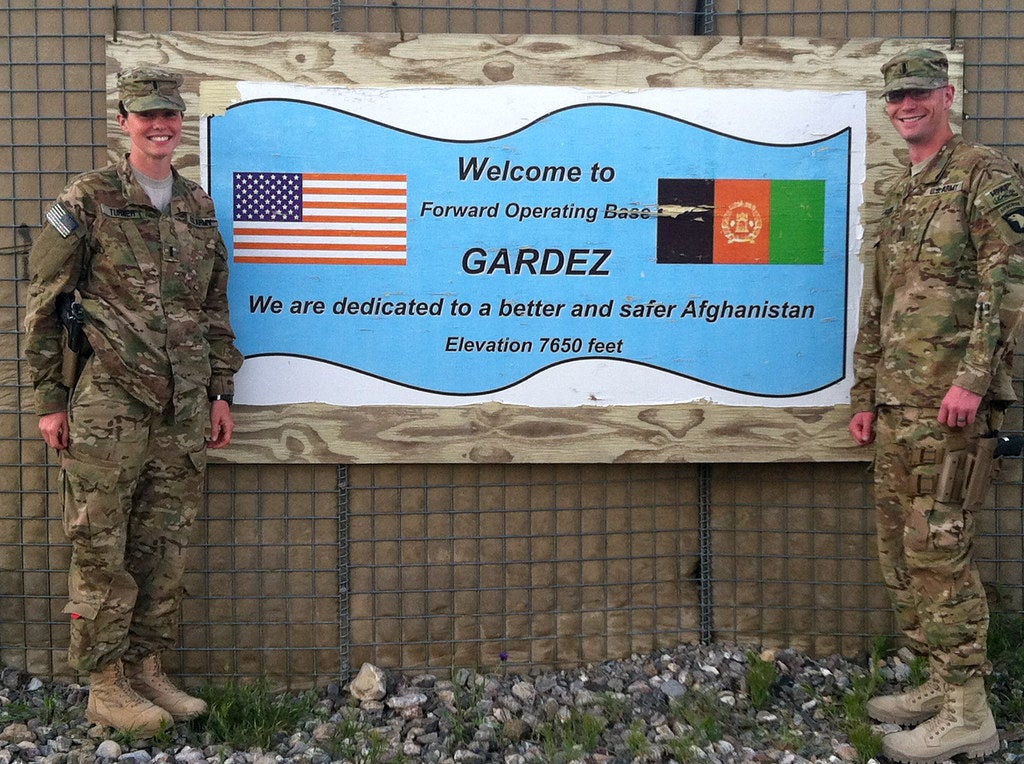
When you weren't together, how did you stay connected?
Tina: I sent him a card every week during his first deployment; I'm a huge card person. I also vacuum-sealed and sent him mini muffins and his favorite food, Subway cookies. I'd also put movies like 21 Jump Street into care packages, which I know that he and everyone else on his base loved.
When he was over in Afghanistan, we would try to Skype when the connection was decent. I could only see the outline of his head sometimes, and it was really delayed, but it was something. A lot of our communication was over email, and then he'd call me on Sundays to talk. We were planning our wedding during that time, and the time difference made it hard to get an immediate response for time-sensitive decisions. He'd say, "Do whatever you want, it's fine!"
Jesse: We tried to talk every day if we could. When we were deployed at the same time we were in the same time zone, so talking on the phone was very easy to do.
Tina: When we were both deployed, we could talk on a secure telephone line, so we could really discuss what was going on. When only he was gone, the line wasn't secure, so we'd have to worry about what we could say. He could only say "fine" about his day, which made it really hard to feel connected.
How did being apart affect your sex life?
Tina: I waited to have sex until marriage, and we didn't have an official church wedding until after Jesse got back from his first deployment, eight months after our courthouse ceremony. During those months it was fine, because I didn't know what I was missing. But after the wedding, it was really hard. It was like giving a kid a sucker and then taking it away.
To be honest, when I was deployed, it was the last thing on my mind. Being over there, doing the things you're doing and seeing, it takes away that desire. When we finally could have sex again, it rekindled everything and made it a little better, actually.
What emotional toll did being apart have on you?
Tina: The hardest time by far was the first time he was deployed, because I didn't know what it was like over there yet. It was hard not knowing what was happening. I couldn't pick up a phone and call him and say, "Hey, how are you? Are you safe?" If we set a phone call time for 11 and he didn't call by 11:30, I would worry that something happened. Worrying about his safety was by far the hardest. Being apart in the States for training was hard, but this was worse. I was afraid to turn on the news.
Jesse: It can be very distracting, because somehow when you're apart every little thing reminds you of them, so trying to keep it off your mind is nearly impossible. It was hard not to come home to Tina at the end of the day, or have her there when I had a particularly stressful day. I missed hearing her laugh in person.
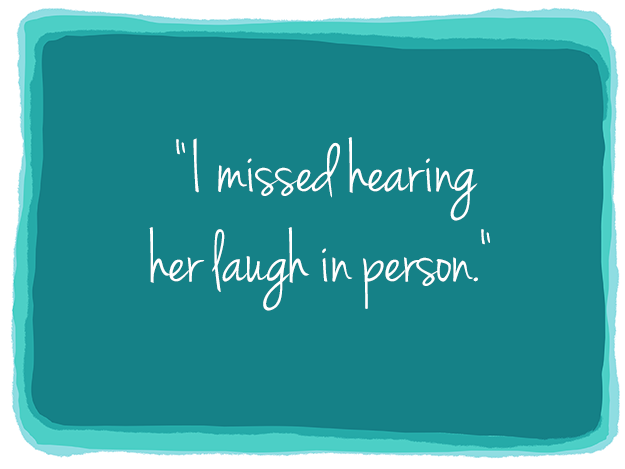
Tina: I did think it was going to be a lot harder than it was, based on my previous relationship. My ex was emotionally abusive, and I had to pull teeth to talk to him every few days. Jesse is extremely understanding and supportive and has given me a lot of confidence. Because of him, I was surprised at how easy it was. But I think we're kind of an exception.
Since they both returned from Afghanistan in 2013, Tina and Jesse have been living together in Illinois. They've spent periods of two to six weeks apart for training, and will go long-distance again this summer, when Jesse leaves for an internship in Denver.
What was it like readjusting to living with each other again?
Jesse: Getting to know each other's little quirks that we may not have noticed when we were together for just a weekend was definitely part of the adjustment.
Tina: When Jesse moved in with me I'd been living in my own place for almost a year, so it sort of felt like he was moving into my space. I had to make room for his stuff, give up some of the closet. I knew where everything was supposed to go. Eventually, I realized it didn't matter where the pot gets left on the stove, because we were together again.
Are there any ways you think it's actually strengthened your relationship?
Tina: It brought us way closer together. It forced us to talk more and have deeper conversations at the beginning of our relationship, before he was deployed. It got us talking about things that don't normally come up in regular conversation. It was a [emotional] burden being apart, but it wasn't a burden on our relationship.
Jesse: We learned so much about each other that I think we got closer than we would have if we had been together. It proved to me that if we could make it through long distance, sometimes on opposite sides of the world, we could make it through anything.
What advice do you have for anyone in (or planning to be in) a long-distance marriage?
Tina: The two most important things are trust and communication. It'll never work if you don't trust them or they don't trust you. The Army is a very male-dominated work force, so if he got jealous every time I was with another man, he'd go crazy. Always make time for each other, even if you're both busy and it's just a five-minute phone call before bed. The longer you go without talking, the more disconnected you become. What I tell my friends when they're facing a deployment is to always think of the other person. Do things for them, even if it's just a card or a care package. Now, when we're together, I still do things like that.
Jesse: Be respectful and understanding of each other's schedules, trust each other, and communicate often. I'm not going to lie and say that it's not that bad, because it does suck. There were times that I missed Tina so much that it physically hurt. Suddenly, nothing in the world matters because you aren't with the person you love. I would have given up every material possession I owned to get to see her.
Jacqueline, 45, and Patrick, 47, Hilton Head, South Carolina
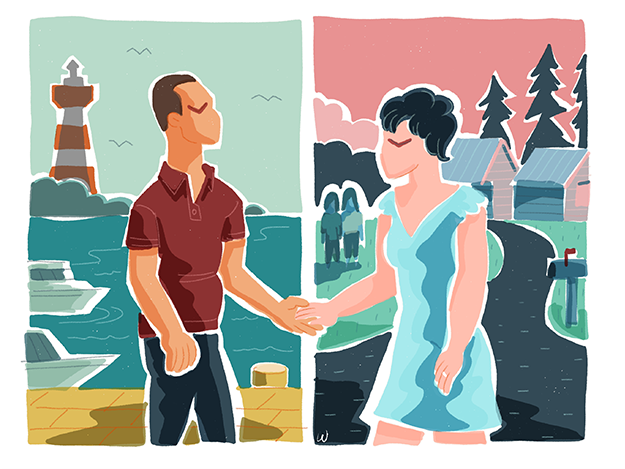
Jacqueline and Patrick have been married for 21 years. They spent 14 months living apart, beginning in March 2013, while Patrick started a new job. Jacqueline stayed home in Mercer, Wisconsin, with the couple's two daughters to sell their house and wait for their eldest to finish high school.
Jacqueline: I didn't mentally prepare for our separation. I was so excited to go [to South Carolina], I was thinking, We'll have nice weather, and we won't have to dig out of 300 inches of snow every year! The first two weeks he was gone were fine, but after a month, I realized he was really gone.
We had already been married for 21 years, so moving away from each other kind of felt like a death, in a weird sort of way. We only saw each other three times. We planned for more, but with work requirements and kids, we saw each other just for three holidays. Even though we got to talk, it was like we were in mourning.
How did you stay connected?
Jacqueline: We talked every day, sometimes a couple of times a day. It was constant contact; we never went a day without talking. We talked over the phone, mostly. We did text, but we would try to talk and hear each other's voices. We Skyped sometimes, but not too much.
What emotional toll did the separation take on you?
Patrick: We grew apart. At some point, the excitement of being apart became very boring. Every day was the same: You go to sleep, you work, watch TV, then call each other before bed. The conversations were similar every day; we'd talk about the day, then the kids. The conversations became shorter. It was all tough.
Jacqueline: It was all over the board. We were trying to sell a house, my daughter was graduating high school; it was emotional. There were days where I would get into my car on the way to work, have my cry session, and then be fine. You get into a routine where you just accept that they're far away. It made my husband and I stronger.
The hardest part was feeling like he wasn't there for important moments and it was up to me to make all the decisions. I wasn't questioning our love, but the demands of being the sole present parent were hard.
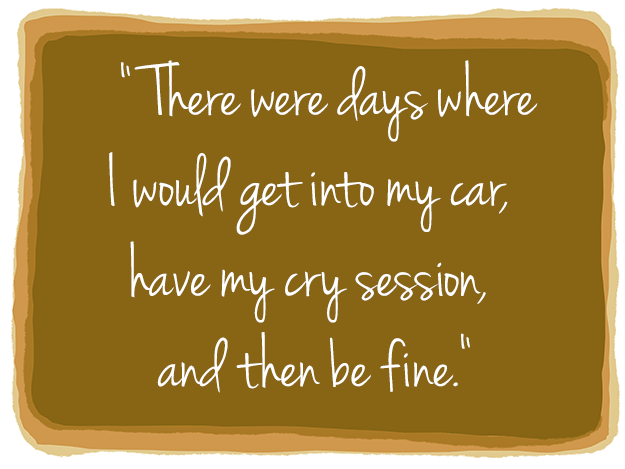
Patrick: I missed just being together and seeing smiles, laughing together, and talking. I missed knowing what each of us were saying and not confusing language through text.
How did it affect your children?
Jacqueline: We have two teenage daughters. For them, it was an intense feeling of missing. It's like part of you is lost. They missed their dad, and I became the primary parent. When we started living together again, our daughters would ask me everything. He said, "They don't come to me, it's like I'm invisible." They love their dad, but they were like, "Mom's the one that's been here."
Jacqueline and Patrick have been living together in South Carolina with their younger daughter since June 2014.
What was it like readjusting to living with each other again?
Jacqueline: Going back to not having to juggle everything by myself was harder than I expected. But when we got back together, it was like when we first started dating. It was kind of neat. He has a quirky, weird sense of humor, and I missed that.
Patrick: We had to fall in love all over again. Being apart really made us aware of the weaknesses in our marriage. We never stopped loving each other, but some of the spark that drew us together in the first place was gone. When we got back together, we had to reignite the spark and make changes in our relationship to turn weaknesses into strengths. It was more work than just puppy love.
We also had to gain and build trust, which was hard. The trust problems existed prior to leaving. Neither of us ever cheated or strayed, it was more like we had to make sure we trusted that the marriage is what we both wanted and we were committed to making it work. That took time. We both loved each other, but we had to make sure that was enough to make it work. We established a much closer communication style and opened up to each other more deeply than ever before. Now, things are better than ever.
Jacqueline: He was probably a lot lonelier than I was. I still had my friends around; I still had my kids. I missed him a lot, but I was busy. He came home to an empty apartment. I was more sad for him than for myself. I wouldn't do it again, but we did it for his career and what we thought would be best for our family.
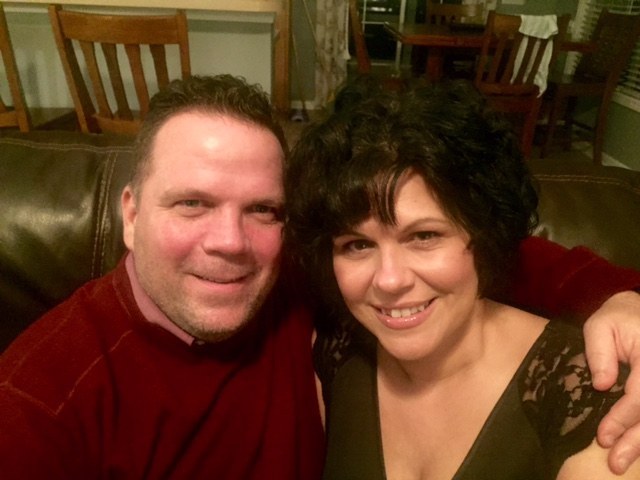
Were there any aspects of living apart that were easier than you expected?
Jacqueline: I like my alone time. It was kind of nice that I was able to read more. I had a lot more girlfriend time, which I didn't always get a lot of after I got married. I made my own schedule, and I kind of liked that — I didn't have to check with anybody.
Part of it made me stronger in ways that I didn't know I could be. Having to take care of the kids and selling the house by myself definitely made me stronger.
Patrick: I got in lots of golf and exercise, had TV nights, and made friends. They helped me kill time physically, but not emotionally. It made me look at myself and the path I was on and I turned to God. Since that day, every day with her has been better.
What advice do you have for anyone in (or planning to be in) a long-distance marriage?
Patrick: Establish hobbies or projects that you can both do so you have more to talk about and continue to do once you're back together. It will eliminate the awkward conversations about how their day was.
Jacqueline: Make sure you talk every day. Remember why you got married, and hold on to what bound you together.
Interviews have been condensed and lightly edited for clarity.
